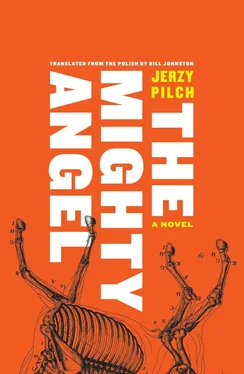“And I took you for an irresponsible womanizer. To be frank, I took you for nothing but a heartless bastard. And there was a brief moment, but a moment nevertheless, when out of a sense of female solidarity I may even have wanted to punish you. In any case, I had nothing against the idea of you suffering, though I knew you wouldn’t suffer long, I was sure you’d only suffer for a short time and that you’d quickly find consolation in someone else’s arms. But you’ll never be in anyone else’s arms again. If you do that, it’ll be the end of both of us.”
“I’ll never be unfaithful to you. I’ll never deceive you. Before, I would have said that from my point of view those are utterly suicidal statements, a year ago I would have said so; but I’ve forgotten that tongue. I’ve lost my tongue, or perhaps I’ve freed myself from the bonds of that tongue. Or perhaps my tongue has descended from the heights of bombast.”
•
A mere month ago I planned to describe in this chapter my own personal network of private drying-out facilities, which were run by my successive or simultaneous girlfriends. I even thought up grandiose names for them: Barb the Broker, Joanna Scourge of the Asylum, the Seductive Movie Star, the Uruguayan Center Forward, Joanna Catastrophe — I wrote these names on index cards, but recently, early one morning (leaden clouds over the alco ward) I saw a great conflagration of all my index cards, and all my files and notes and names were burned. The original models for the characters turned to ash, nothing was left of them, for either there was nothing there to begin with, or they were too flammable, which amounts to the same thing. All my elegant notebooks, with lines and no margins, were burned; the fire consumed the archive of ideas I had in my head, and literature came to an end. I had finished writing my treatise on addiction, or rather I’d lost my enthusiasm for writing about addiction, I could think only of you. My head and my heart were filled with an intense emotion that I did not know was possible. If love is everything that exists, what name can be given to our super-existence?
Just a few days ago I was going to write a farewell speech to be delivered before I left the alco ward: Dear fellow alcos! Respected Dr. Granada! Viola, nurse above nurses! Venerable therapist of the double name! And you, quieted and alluring she-therapists! Tomorrow I shall quit these walls, that were once erected by Russian or Austrian builders; I leave with a light heart. I speak of the Russian or Austrian walls because my liberated brain is filled with something of a tangle. I get Kraków mixed up with Warsaw, the Kobierzyn asylum with the Tworki asylum; I confuse the Vistula with the Utrata, Iwaszkiewicz with Gombrowicz, and the oceanic billows of smoke issuing from the furnaces of the Sendizimir (formerly Lenin) steel mill are associated with the clouds of odor rising from the pajamas of the insane. Aside from one thing, of which I will not speak, at present there are no certain things in my mind; yet I would like to tell you about one thing, not the thing of which I will not speak, but a quite different thing. So then: regardless of whatever faces I make, regardless of my mocking laughter, regardless of the phrases I recorded in my notes, which were consumed by a conflagration of the heart, and regardless of all my poses, know this: I adore you all, my venerable prototypes, I adore you with my most sincere adoration. You exist already, but in the fervid sincerity of my narration you exist even more. Be well, you shades of my characters, always and everywhere I will tell enthralling tales about you. .
Just yesterday I was going to write my farewell speech, but early this morning I lost the ability to compose artful orations. I lost that ability and with a profound sense of relief I thought to myself that now I would describe how I placed old Gazeta Wyborczas on a stone bench overlooking the Utrata; the gardens, deserted at dawn, that in a couple of hours would be filled with the deceased; your black blouse in the tall wet grass.
On Sunday, around eleven in the morning, I stand by the hospital gates. Rolled up safe in the voluminous pockets of my expensive track suit is another chapter; I’m sort of able to write here, and sort of not.
“How does your writing about drinking affect your drinking,” Kasia the she-therapist asked during one of my first sessions.
“It doesn’t affect it at all, because when I drink I don’t write, and when I write I don’t drink. They’re two separate things.”
“No, they’re not two separate things. Don’t pretend you don’t understand the question.”
“I understand the question and I’m answering it. The author isn’t the narrator and the narrator isn’t the author. They teach you this at the highest levels of initiation into the study of literature, and they’re right. If I construct a character, even if the character is based on me, even if he drinks like me, and even if his name is Jerzy, the character still isn’t me, for goodness sake!”
“I disagree. The narrator is always you; he arises from your thoughts and comes into being in your mind.”
I wanted to say that not everything that comes into being in my mind is associated with me; I wanted to quote once again (I must have quoted it a thousand times) the line from Kafka: “I have nothing in common with myself.” I wanted quite simply to fend off the prohibition on personal creativity that was forming in the head of that charming she-therapist in glasses; but I decided not to. As everyone knows, prohibitions breed resistance, and resistance can often be highly creative.
“Apparently you’re writing a book about drinking while you’re here,” said Kasia, unnecessarily delaying her arrival at the inevitable conclusion.
“For some time now I’ve been writing about love.”
“In any case, don’t write about drinking for the moment. Leave that for later. Because you know, Jerzy, later you won’t feel like writing about it. Later, who knows, you may not feel like writing at all. I mean, in life you can’t just be a writer; you also have to be a friend, acquaintance, worker, father, lover, vacationer, goodness knows what else.”
“Goodness knows,” I said and fell silent again, and remained silent, because what was I supposed to say? Was I supposed to answer like a true graphomaniac that if I won’t feel like writing, I won’t feel like living? So I was silent for a good while; eventually, though, I forced myself to break the silence and say:
“When I write I don’t drink, and if I wrote every day, then every day I wouldn’t drink. That’s all it’s about, that’s the purpose of this therapy; as the Sugar King would say, you can’t argue with that.”
“Listen, Jerzy, you belong to the category of difficult patients. Difficult patients are patients who possess exceptional ability in some domain, and when they find themselves in here, not only are they incapable of relinquishing their ability, they actually make use of it to defend their alcoholism. I once had an alco who was a lawyer in civilian life, and in defense of his alcoholism he presented such well-constructed, convincing, beautiful arguments that he almost convinced me. I wept in admiration at the case he made, and it was extremely hard for me to repeat to myself over and again that this person met all the conditions to the letter, that I shouldn’t be misled by his protestations of innocence, because he was displaying as plain as day the six core symptoms of alcoholism. Another alco who passed through here a few years ago, in civilian life a urologist, instead of concentrating on treating himself for his alcoholism and leaving it at that, busied himself with the other alcos and treated them for urological problems, or at the very least offered urological advice.”
Читать дальше












